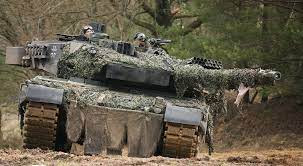Germany appears to be indicating that allowing other countries to send Leopard tanks to Ukraine may be the short term solution to addressing growing pressure for it to do so.
Poland has now resubmitted a request to export some of its Leopards to Ukraine. If Germany approves that transfer, it could resolve the matter at least for the short term. If Germany refuses again or drags its feet, the other countries have promised they will defy Germany and send the tanks without its permission, with potentially disastrous implications for Germany's arms export industry. JL
Loveday Morris and Emily Rauhala report in the Washington Post:
Polish Prime Minister Mateusz Morawiecki said Monday that Warsaw would submit a request to Germany to reexport its tanks to Ukraine, after Berlin indicated it would not block such a move. German Foreign Minister Baerbock (said) that if Poland asked Berlin’s permission to send Leopard 2 tanks to Ukraine, Berlin “would not stand in the way." If Germany continues to stall, Poland will work with other allies to build a “coalition” to send the tanks.Baerbock told France’s LCI TV that if Poland asked Berlin’s permission to send Leopard 2 tanks to Ukraine, Berlin “would not stand in the way."
Berlin has so far stalled on unlocking a package of German-made Leopard 2 tanks for Ukraine, saying it wants to proceed with caution amid fears it will be seen as a “participant” in the war. Since Germany manufactures the Leopard 2, one of Europe’s most advanced battle tanks, its permission is required for the tank to be reexported by any of the more than a dozen countries that use it.
European nations including Poland had been hoping that a deal would be struck at a meeting at the United States’ Ramstein Air Base in Germany last week, but it ended with no agreement on the tanks. As Germany has dragged its feet, Morawiecki has threatened to send the 14 Leopard 2s that Warsaw had promised, with or without Berlin’s approval.
Ukraine has said it desperately needs the tanks as it faces a brutal war of attrition waged by Russian forces and Wagner Group mercenaries on its eastern front lines.
If Germany continues to stall, Poland will work with other allies to build a “smaller coalition” to send the tanks, earlier Morawiecki told the Polish Press Agency.
“We will not passively watch Ukraine bleed to death,” he said. “The Ukrainian people are fighting for our freedom.”
The decision to support the Ukrainian military is justified both “politically and morally,” he added. “I hope Germany will understand this sooner rather than later.”
Government spokesman Steffen Hebestreit said that any request from Poland to reexport tanks would be subject to the “standard procedure” and go through Germany’s Federal Security Council — a cabinet committee that deals with arms exports.
He said he could not specify how long it would take for such a request to be approved but assumed it would not take “months.”
“I am rather hopeful that we will find a solution,” he told reporters in Berlin. When it comes to Germany sending its own contingent of Leopard 2 tanks, the government has not ruled that out, Hebestreit said. “It just hasn’t decided yet.”
Speaking to ARD television on Sunday, German Defense Minister Boris Pistorius reiterated that Germany does not want to rush a decision but said one would be made “soon.”
The United Kingdom has pledged its British-made Challenger 2 battle tanks, while France is also mulling a delivery. Speaking about the possibility of sending Leclerc tanks, one of the main tanks used by France, President Emmanuel Macron said Sunday at a news conference with German Chancellor Olaf Scholz that “nothing is excluded.”
But he added a condition: that a tank transfer is “not escalatory” and doesn’t weaken France’s own defense capabilities.
Over the course of the war, Germany has been cautious not to be seen as a leader when it comes to arms deliveries. It said earlier this month that sending its Leopards would be eased by Washington sending its M1 Abrams tanks, which Pentagon officials have said are not the best fit for Ukraine in terms of operability and would take a long time to arrive. But Berlin appeared to drop that position last week as Pistorius said there was no “linkage” between the Leopards and the U.S. tanks.
The question of tanks has highlighted an enduring split on how much to do for Ukraine, with Poland and the Baltic nations leading the push for swifter, more aggressive support. On Saturday, the foreign ministers of Estonia, Lithuania and Latvia published a joint statement on the issue, urging Germany to “provide Leopard tanks to Ukraine now.”
“This is needed to stop Russian aggression, help Ukraine and restore peace in Europe quickly,” they wrote. “Germany as the leading European power has special responsibility in this regard.”
In recent weeks, the United States and some NATO allies have argued that Ukraine needs more advanced weapons to shift battlefield dynamics, particularly ahead of a possible Russian push this spring. Urmas Reinsalu, Estonia’s foreign minister, said Monday that Ukrainian forces need more support so that they go on the offensive themselves.
“We need to give the Ukrainian people a shield,” he said, “But also a sword to defend their territory.”




















0 comments:
Post a Comment